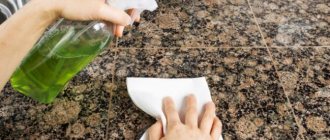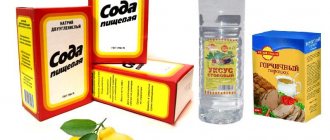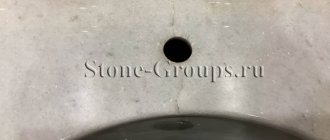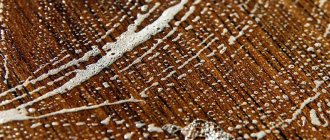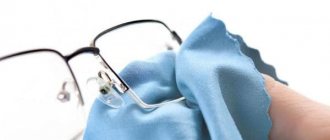Granite sinks are often coated with a sealant to protect the natural stone from scratches and erosion. You need to wash your granite sink with a special gentle cleaner that will not spoil the sealant or discolor it. To remove stubborn stains, you need to use powdered chalk and hydrogen peroxide, which will absorb the stain directly from the granite. Continue reading this article to find out how to clean a granite sink and how to get rid of stubborn stains. You can order daily cleaning here.
Features of cleaning a stone sink in the kitchen
The stone sink in the kitchen should be cleaned daily, after washing dishes. Basic rules of care for every day:
- There should be no food residue left in the sink;
- Regular use of soap or dishwashing detergents;
- Treat the surface with a sponge or soft cloth made of natural fibers and soap foam;
- Rinse off any remaining detergent with warm running water.
Regular and proper cleaning will prevent the formation of stubborn stains and mildew.
Once a week, you need a more thorough cleaning of the stone sink in the kitchen and disinfection with products containing chlorine - Domestos, Belizna, which are distributed over the bowl, left for 10 minutes and rinsed.
Every month, wash your stone kitchen sink with dishwasher tablets, which are dissolved in water to a mushy state, applied to the surface, left for half an hour, rinsed off and wiped dry.
To clean a stone sink in the kitchen, the main rule is that it is forbidden to resort to too aggressive cleaning, use organic solvents, acids, rough brushes, metal sponges, products with large abrasive substances, and also do not rub the surface too hard. For cleaning, soft sponges are used, which remove dirt without damage and restore shine.
1 Advantages of artificial stone sinks
View this post on Instagram
Publication from Porcelain stoneware #Laminam#Kerlite (@themasterproff)
Above we briefly talked about the advantages of a porcelain stoneware sink. Let's look at this in more detail here.
An artificial stone sink has at least four advantages:
Firstly, it is strength
Porcelain tiles resemble natural stone, therefore they have not only a similar appearance, but also the same hardness. This factor captivates many buyers, because such a sink looks expensive and rich, but at the same time is inferior in price to analogues made from natural materials.
Secondly, durability
A sink made of artificial stone is difficult to scratch during cleaning and is unpretentious to detergents. If you choose too aggressive household chemicals to remove plaque and other contaminants, the quality of the sink will not deteriorate as a result. However, you still shouldn’t abuse it. Also, porcelain stoneware easily tolerates temperature changes.
View this post on Instagram
Publication from Sergey Pivovarov (@sergey.pvr)
Thirdly, environmental friendliness
Artificial stone sinks use exclusively safe components that will definitely not harm your health. That is, there will be no harmful fumes or other negative aspects when porcelain stoneware comes into contact with water and household chemicals. Therefore, you can wash both dishes and food in such a sink without fear.
Fourthly, aesthetics
Sinks made of artificial stone look very stylish and can be an ideal addition to both eco-interior and loft-style interiors. This variability of porcelain stoneware helps it blend harmoniously into any space and contributes to the creation of harmony and comfort.
Chemicals for cleaning stone sinks in the kitchen
Dirt accumulated on a stone sink in the kitchen, stubborn stains, stains can be washed off using household chemicals marked for composites, which are used according to the instructions on the package. This group includes several professional compositions:
- Special products for composite stone sinks, for example, Schumanite, Cillit Bang universal spray, Akemi cleaner;
- Chlorine-containing compounds effectively wash away plaque, grease and dirt, beetroot, coffee, tea stains, and also have a disinfectant effect, killing fungi and microbes - Belizna, Domestos;
- Dishwashing liquid is used for daily care and to prevent stains, especially if the composition contains natural ingredients. Soap cleans the stone without leaving a waxy film on the surface. A soap solution removes coffee, tea, and wine stains;
- Melamine sponges perfectly remove lime and salt stains and rust stains from stone sinks in the kitchen thanks to the small crystalline particles in their structure. No aids are needed during operation. To clean the kitchen sink, rub it with a sponge, let the surface dry, and rinse it 2-3 times with warm water. Apply a few drops of vegetable oil to a cotton pad, rub the bowl of the kitchen sink until shiny, leave for 7-10 minutes, wipe with a dry cloth made of natural fibers;
- To clean stubborn dirt from a stone sink in the kitchen, use chlorine lime. To do this, fill the sink with water, add 2 tablespoons of powder, stir, and leave for half an hour. Then the liquid is drained, everything is thoroughly washed and dried;
- For white and light stone kitchen sinks, bleach is suitable, which removes dark stains from tea, coffee, beets and other colored juices. Remove all excess from the bowl, close the drain, fill with hot water, add 2-3 cups of white, leave for about an hour, open the drain hole, wipe the surface dry.
On a note! To clean a stone sink in the kitchen, household chemicals in the form of gels or creams with a gentle effect on the surface are suitable. The well-known Comet and Pemolux powders can also be used, bringing them to a mushy state so as not to scratch the coating.
How not to clean composite material
Some chemicals can damage the composite material. Do not use active alkali or acid, for example, sodium hydroxide or solyanka. If you accidentally get alcohol or vinegar, you need to rinse the sink. You should not use alcohol for cleaning: it corrodes the paint and leaves unsightly light stains.
The following chemical components are contraindicated:
- solvents;
- any acid;
- acetone;
- methylene chlorine;
- compositions used to clean metal and ovens.
All these components gradually damage acrylic stone. When installing a sink, it is unacceptable to insert a silicone seal into the drain hole: it will quickly corrode the paint. Do not clean the composite with metal brushes, rough sponges or harsh abrasive powders.
Folk remedies for cleaning stone sinks in the kitchen
Before purchasing special products for cleaning a light or dark stone sink, you can try to wash it using folk recipes, the ingredients for which are found in every kitchen:
- Lemon is a universal remedy that removes white limescale, tea and coffee stains, dried food residues, and gives a fresh aroma. In case of severe contamination, rub the surface with the squeezed juice, leave for 20 minutes, and rinse with clean water. Citric acid also effectively removes stains. To wash away stubborn dirt, close the drain hole with a stopper, take warm water, add 50 g of powder, leave overnight, drain the liquid in the morning and wipe with a rag;
- Baking soda perfectly removes dark coffee stains, salt and grease deposits. To prepare the mixture, pour a few tablespoons of soda powder into a clean container, dilute with water to make a paste, wipe the bottom and walls of the stone sink with a sponge, leave for 10 minutes, then rinse;
- Mustard powder works well for removing grease deposits and fresh stains on the walls of a stone sink in the kitchen. Mustard is first diluted with water to a mushy state, applied to stains or the entire surface of the sink, left for 30 minutes, washed off with clean water;
- Carbonated drinks Sprite and Coca-Cola contain phosphoric acid, which perfectly cleans plaque and any dirt. To clean a stone sink, close the drain, pour in soda and leave for half an hour to an hour. Periodically wipe the walls and wings of the sink with a sponge soaked in a drink;
- Gel toothpaste is used to clean rust stains and whiten stone kitchen sinks. Simply rub the stains with a sponge and then rinse with water. A bleaching paste, which is rubbed into the stains and left for half an hour, then wiped with a rag soaked in vinegar will help restore the whiteness of a light stone sink;
- Table vinegar will help clean the kitchen sink of rust, lime and unpleasant odors. Vinegar is pre-diluted with water in the following proportions: 1 part of a 9% solution requires 2 parts of water or 1 part of acetic acid to 10 parts of water. A sponge is moistened in the resulting solution and rubbed onto all surfaces of the stone sink in the kitchen. More stubborn stains are wiped with the rough side;
- Chalk will help remove stubborn stains from a stone sink in the kitchen. To do this, it is diluted with hydrogen peroxide, the resulting slurry is applied to the surface and covered with cling film or tape to create a greenhouse effect. The chalk is removed and the sink is treated with clean water.
How to Remove Scratches from a Stone Kitchen Sink
Improper use or careless maintenance of a stone sink in the kitchen contributes to the formation of scratches on the surface, which spoil the appearance and create obstacles when cleaning the bowl. Small cracks can be repaired yourself at home:
- A stone kitchen sink with a matte finish is wiped with the rough side of a sponge with baking soda applied and washed off with water. For deeper scratches, use sandpaper No. 240, which is used to carefully process the damage, and for final grouting - No. 80;
- On a glossy stone kitchen sink, small cracks are treated with liquid with ammonia and wiped with the soft side of the sponge in a circular motion, then the product is washed off and the sink is dried. Then a special polishing mixture without silicone additives and citrus extract is applied to the surface. For deep damage, you will have to use a grinder with different attachments.
What is porcelain tile afraid of?
There is a saying, “Strong as granite.” The stone has become the standard of durability and reliability. It is used to construct buildings, to decorate embankments, and as a covering for pedestrian streets. But even durable granite has its weaknesses, which make it difficult to use as a coating for household plumbing. Below are the problems encountered when using porcelain stoneware sinks:
- Chips. If chips, scratches or cracks appear on the surface of a sink made of this natural material, they become areas for stains to spread. Dirt absorbed under the protective coating quickly penetrates into the deep layers of porcelain stoneware;
- High absorption (absorption). Due to its fine-porous structure, natural stone absorbs various contaminants well. How to clean a porcelain stoneware sink in a kitchen in a similar situation? The best option for deep stains that evenly cover the entire surface are liquid products. They have the ability to remove stains not only on the surface, but also in deeper layers;
- Heat instability. If you place a hot frying pan or pot on the edge of the sink, greasy marks appear on the surface of the porcelain stoneware, which are very difficult to remove. There are no such problems with iron sinks;
- Destruction of the top layer when using abrasives and iron brushes. Mechanical cleaning is not permitted for porcelain stoneware sinks.
How to clean stubborn stains from a kitchen sink
After prolonged use, dirt remains on the surface of a stone sink in the kitchen, which is difficult to clean. It seems that the appearance of the sink is ruined, but there are recipes that will help cope with the problems:
- You can remove white limescale from a stone sink in the kitchen using household chemicals for composite surfaces. The bowl is treated with a wet sponge, a cleaning agent is applied, no additional exposure is necessary. After a few minutes, the liquid is washed off;
- Rust can be easily washed off with regular soda. It is recommended to take clear drinks. The liquid is heated, poured into the bowl, left for 10-15 minutes, then begin scrubbing; in difficult cases, the procedure is repeated several times. Ammonia and hydrogen peroxide will help clean a stone kitchen sink from rust. The components are mixed in equal proportions and applied to the contaminated area. When mixed, a chemical reaction occurs that is responsible for cleaning the surface;
- Alkaline solutions will help remove traces of tea and coffee from a stone sink in the kitchen. Instead of intensively rubbing the surface, the contaminated areas are smeared with lemon juice, left for 2 hours and treated with a clean, dry cloth.

